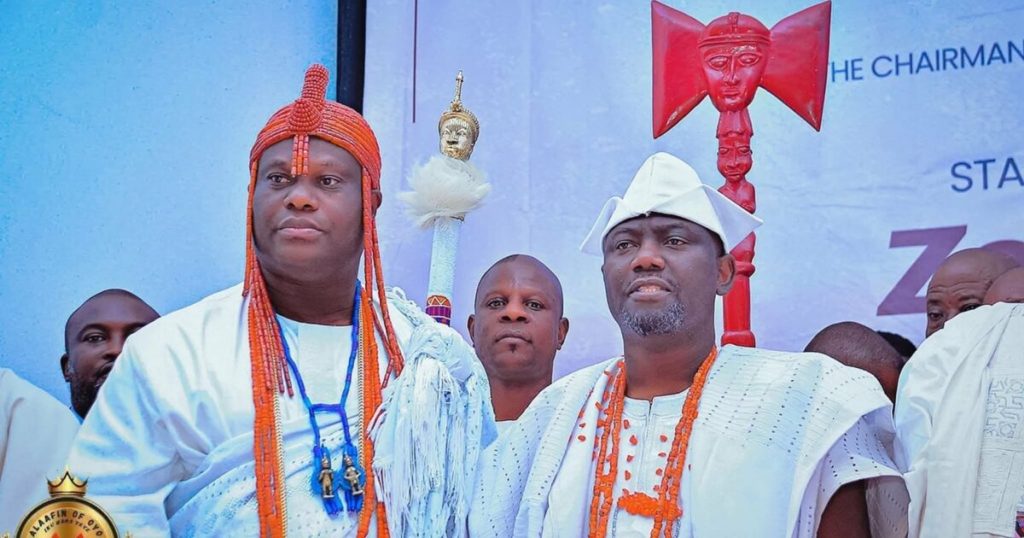The Yoruba Leaders of Thought, also known as Egbe Ilosiwaju Yoruba, have issued an urgent plea for reconciliation between two prominent traditional rulers, the Ooni of Ife, Oba Adeyeye Ogunwusi, and the Alaafin of Oyo, Oba Abimbola Owoade, following a recent resurgence of hostilities. The renewed tension reportedly stems from the Alaafin’s disapproval of the Ooni’s decision to bestow a title upon businessman Dotun Sanusi. The group’s national leader, Prince Tajudeen Olusi, has called on the governors of Osun and Oyo states, Ademola Adeleke and Seyi Makinde, respectively, to intervene and facilitate a “ceasefire” between the two revered monarchs and their supporters. This appeal underscores the gravity of the situation and the urgent need for a resolution to prevent further escalation of the conflict.
Olusi’s plea, delivered in a statement titled “Time to Sheath the Sword,” highlights the broader implications of the discord. He emphasized the importance of unity and collaboration, particularly at a time when national focus should be directed towards supporting President Bola Tinubu, a prominent Yoruba figure. Olusi also proposed the establishment of a standing committee under the South-West Council of Obas to proactively address and mitigate future disagreements between traditional rulers, ensuring that such conflicts are resolved swiftly and discreetly, thus preserving the respect and reverence accorded to these important cultural figures. This proactive approach, he argued, would prevent similar disputes from escalating into public spectacles that detract from the dignity of the traditional institutions.
The Yoruba Leaders of Thought expressed their deep concern over the timing of this conflict, suggesting that it serves as an unwelcome distraction at a crucial juncture in national affairs. They lament the “weaponization” of historical narratives, which they argue are being employed to fuel discord and resentment rather than foster unity and pride among the Yoruba people. The leaders emphasized the importance of focusing on collective progress and development, urging a shift away from internal disputes and towards addressing the technological and developmental gaps that exist between Nigeria and other nations. This call for unity underscores the group’s belief that internal divisions hinder progress and distract from the larger goal of national development.
The ongoing disagreement, according to the group, centers on the rehashing of centuries-old accounts, used either to denigrate or glorify one side or the other. This practice, they argue, not only fails to contribute constructively to the current challenges faced by the Yoruba people but also actively undermines efforts to achieve progress. They maintain that such narratives, when selectively employed to sow discord, detract from the potential for unity and collaboration needed to address critical issues and move the community forward. Instead, they advocate for a focus on narratives that inspire collaboration and progress, rather than fostering division based on historical grievances.
The Yoruba leaders pointedly stressed the importance of unity and collaboration among all Yoruba people, especially in light of President Tinubu’s leadership. They view the current infighting as a counterproductive distraction from the collective effort required to support the president’s agenda and achieve national progress. Their call for unity transcends the immediate dispute between the two monarchs, extending to a broader appeal for cohesion and collaboration across the Yoruba community. They believe that a unified front is essential to effectively address the challenges facing the nation and to support their kinsman in his presidential role.
Finally, while expressing concern over the conflict between traditional rulers, the Yoruba Leaders of Thought also commended President Tinubu for his appointment of Chief Opeyemi Agbaje as the Chairman of the Pension Commission of Nigeria. They expressed their confidence in Agbaje’s ability to address the pressing issue of old-age poverty among pensioners, a problem they recognized as affecting not just Nigeria but the world at large. They expressed hope that Agbaje’s leadership would lead to prudent management of pension funds and improved access for retirees, ultimately ensuring a more comfortable retirement for Nigerian citizens. This commendation, placed alongside the plea for reconciliation, demonstrates the group’s multifaceted approach to leadership and their focus on both cultural harmony and practical improvements in the lives of the Yoruba people.


